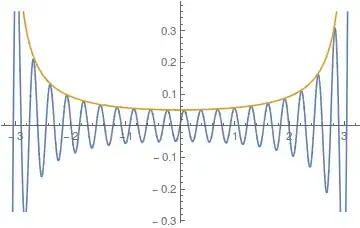$x\cos(x)$ is a continuous and odd function, so its Fourier series over $(-\pi,\pi)$ only has sine terms.
$$ \int_{-\pi}^{\pi}x\cos(x)\sin(nx)\,dx=\frac{1}{2}\int_{-\pi}^{\pi}x\sin\left(\left(n+\tfrac{1}{2}\right)x\right)\,dx+\frac{1}{2}\int_{-\pi}^{\pi}x\sin\left(\left(n-\tfrac{1}{2}\right)x\right)\,dx $$
and
$$ \int_{-\pi}^{\pi}x\sin(mx)\,dx\stackrel{\text{IBP}}{=}\frac{1}{m}\left[-x\cos(mx)\right]_{-\pi}^{\pi}-\frac{1}{m}\int_{-\pi}^{\pi}\cos(mx)\,dx $$
leads to $ \int_{-\pi}^{\pi}x\cos(x)\sin(x)\,dx = -\frac{\pi}{2} $ and
$$ \int_{-\pi}^{\pi}x\cos(x)\sin(nx)\,dx = \frac{2\pi n}{n^2-1}(-1)^n $$
for any $n\geq 1$. This gives
$$ x\cos(x)+\frac{\sin(x)}{2}\stackrel{L^2(-\pi,\pi)}{=}\sum_{n\geq 2}\frac{2n(-1)^n}{n^2-1}\sin(nx) $$
with pointwise convergence in $(-\pi,\pi)$ and uniform convergence over any compact subset of $(-\pi,\pi)$, like in the case
$$ \frac{\pi-x}{2}\stackrel{L^2(0,2\pi)}{=}\sum_{n\geq 1}\frac{\sin(nx)}{n}.$$
Here the partial sum up to $n=20$ compared with the actual function:

and the error compared to $\frac{1}{20\cos(x/2)}$:


